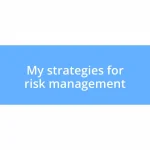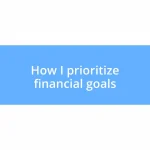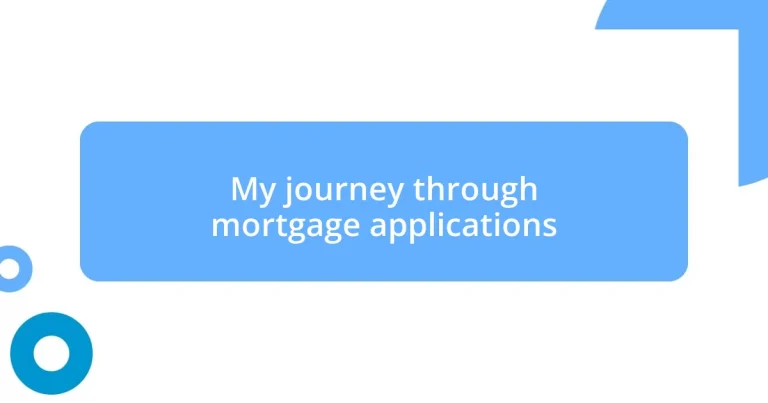Key takeaways:
- Organize essential documents like pay stubs, tax returns, and bank statements to streamline the mortgage application process.
- Understand mortgage terminology (e.g., debt-to-income ratio) to empower yourself during the application journey.
- Maintain clear communication with your lender and avoid major financial changes while your application is in process.
- Stay patient during underwriting; managing anxiety through distraction can help during the waiting period.
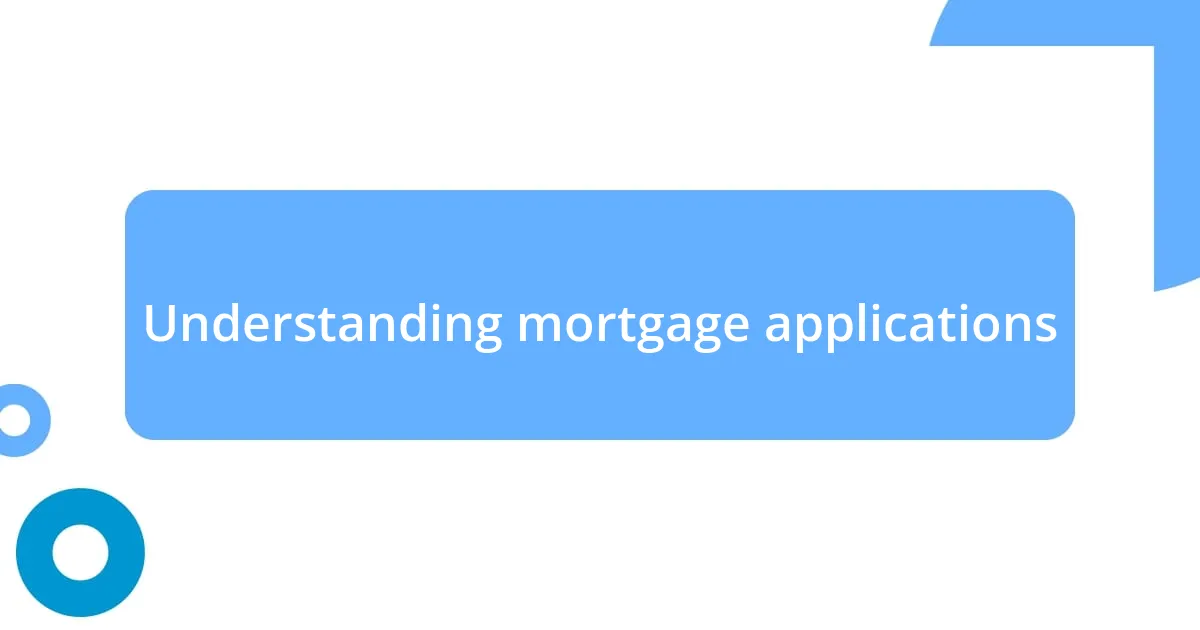
Understanding mortgage applications
Navigating the landscape of mortgage applications can feel overwhelming at first. I remember sitting at my kitchen table, armed with a stack of documents, feeling like I was preparing for a final exam. How could a few pieces of paper hold the key to such a significant investment?
The mortgage application process requires a deep dive into your financial history. I learned this firsthand when I had to explain every deposit in my bank statements to the lender. It made me realize how crucial it is to maintain a clear and organized financial record. Have you thought about the importance of tracking your spending? The lender will want to see that you can manage your finances responsibly, and it’s all part of showing them that you can handle a mortgage.
As you go through this journey, you’ll encounter terminology that may be unfamiliar. Terms like “debt-to-income ratio” and “loan-to-value ratio” might sound daunting at first. Yet, understanding these can truly empower you during the process. I recall how demystifying these terms helped me feel more confident, as if I were taking control of my financial future. It’s okay to ask questions; after all, knowledge is your best ally in turning that dream home into a reality.
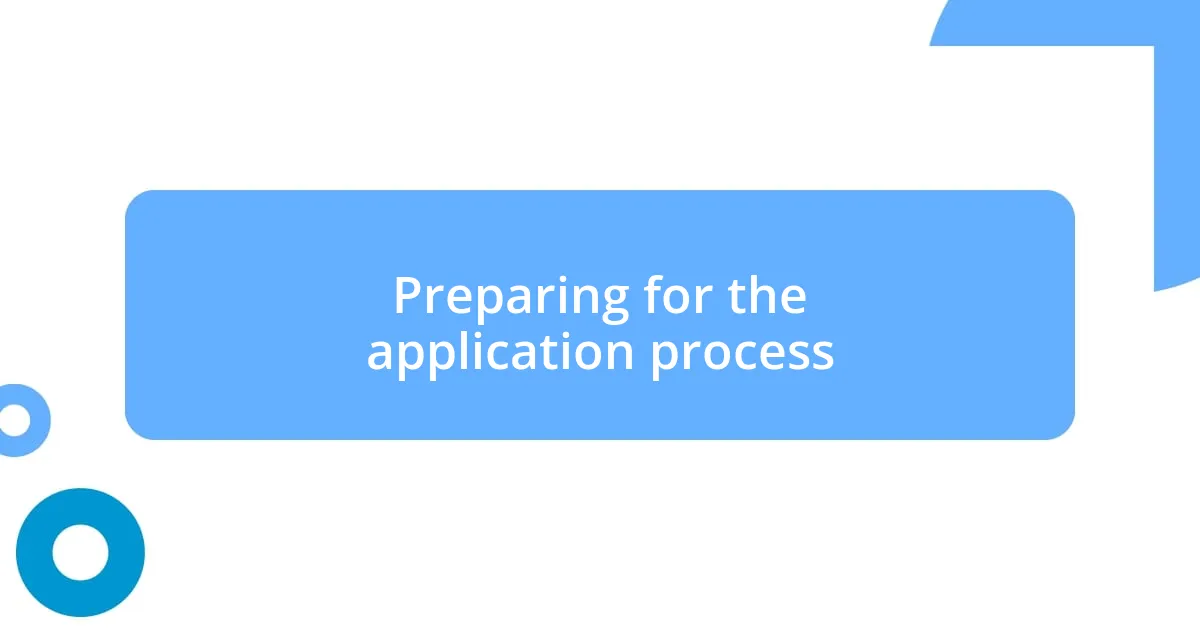
Preparing for the application process
Preparing for the mortgage application process involves getting organized and gathering essential documents. I still remember the feeling of pride when I compiled everything into a neat folder—credit reports, tax returns, and bank statements. It felt like I was not just preparing for an application but also taking charge of my financial future.
To simplify your preparations, here’s a checklist of what to gather:
- Recent pay stubs and employment verification
- Two years of tax returns and W-2 forms
- Bank statements for multiple months
- Documentation of any additional income sources
- Identification, like a driver’s license or passport
- Proof of assets, such as savings or investments
By having these documents ready, you’ll not only ease the process for yourself but also impress the lender with your diligence. A clear path always seems less daunting, doesn’t it?
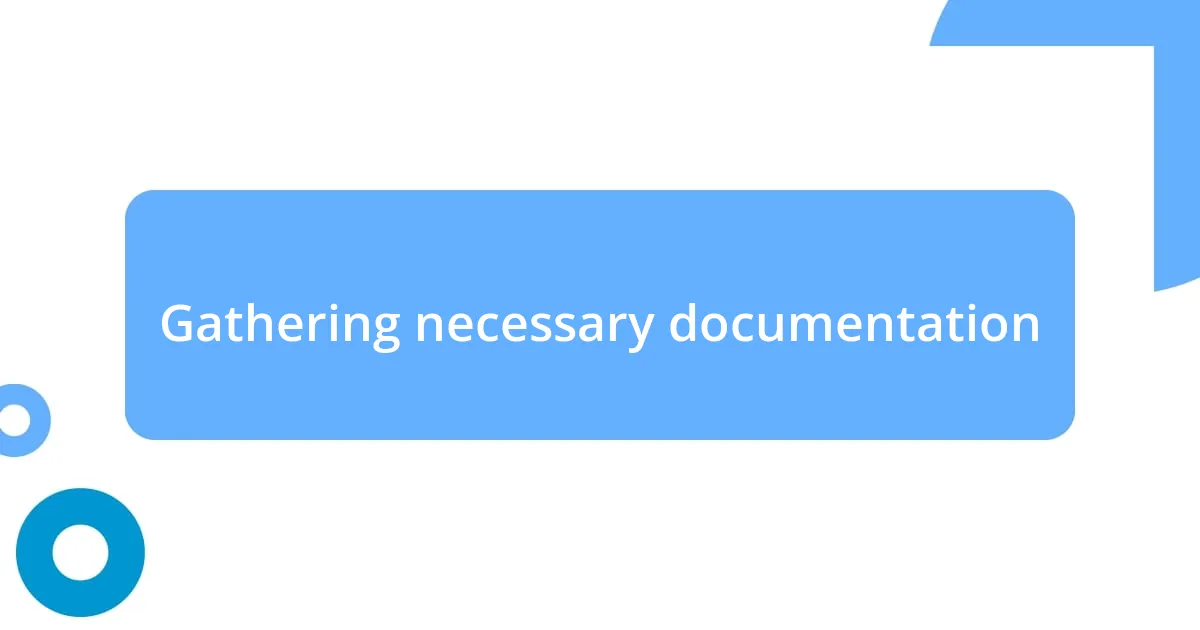
Gathering necessary documentation
Gathering the necessary documentation for a mortgage application can be both a crucial and daunting task. During my own journey, I found it helpful to break down the requirements into manageable chunks. The excitement of home ownership can easily turn into stress if you’re scrambling at the last minute for your W-2s or pay stubs. I remember one late night where I was frantically hunting for my tax returns. It taught me that organization is key to ensuring a smooth application process.
One of the most important things to keep in mind is that lenders require a comprehensive look at your financial history. This includes not just your income, but also your spending habits and outstanding debts. For example, I had to gather my bank statements from the past few months and ensure that all transactions were accounted for. This wasn’t just a logistical exercise; it felt like a necessary reality check. Are your finances in order? Taking the time to assess your financial health can make a significant difference in your application’s success.
To help you streamline this process, I created a checklist during my application. It acted almost like a treasure map guiding me to gather everything I needed without missing a step. Here’s a quick comparison of essential documents you’ll want to have ready:
| Document Type | Importance |
|---|---|
| Pay Stubs | Proof of income and employment stability |
| Tax Returns | Shows overall financial health and income consistency |
| Bank Statements | Validates savings and spending habits |
| ID Proof | Establishes identity and residency |
| Proof of Assets | Demonstrates financial capability for down payment |
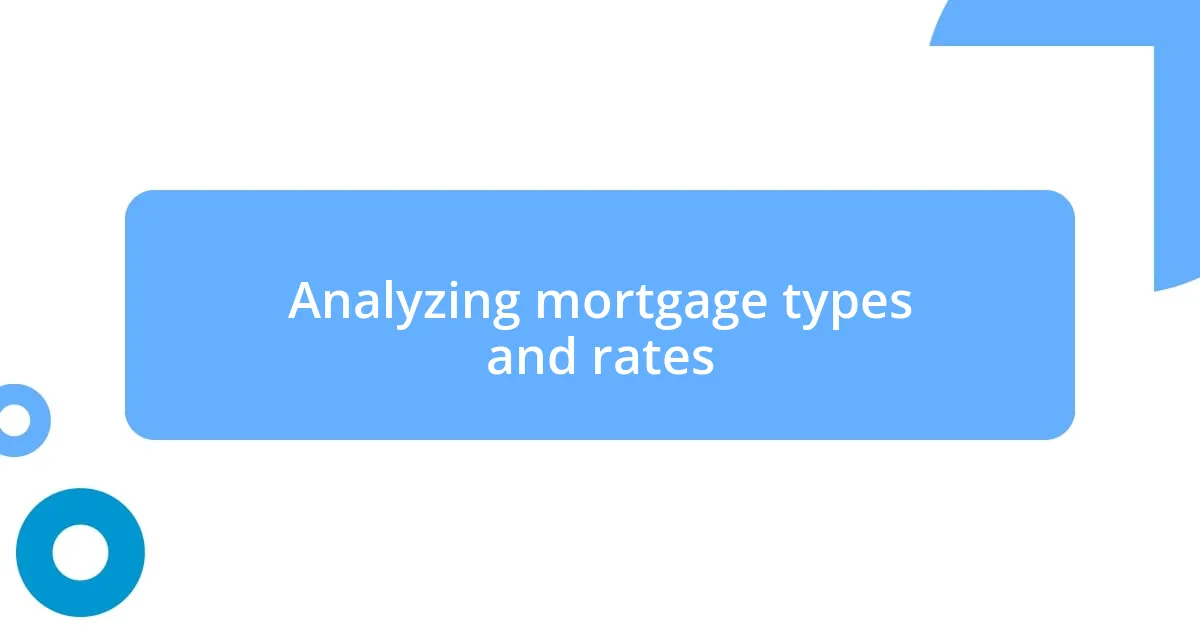
Analyzing mortgage types and rates
The world of mortgages can feel overwhelming due to the variety of mortgage types available. For instance, I distinctly recall analyzing fixed-rate and adjustable-rate mortgages (ARMs) when I was deciding what to apply for. The fixed-rate mortgage appealed to me for its stability; I found comfort in knowing exactly what my monthly payment would be for years to come. However, I also weighed the benefits of an ARM, which could offer lower initial rates but came with potential uncertainty down the road. It’s essential to reflect on your long-term plans and financial situation when choosing a mortgage type. What suits one person may not suit another; it’s all about your comfort with risk and future projections.
The interest rates offered by lenders can vary, and grasping the nuances is crucial. I learned this firsthand as I watched rates fluctuate during my application journey. By keeping tabs on the market, I not only saved money but also gained insight into timing my application. It’s interesting to think about how even a fraction of a percentage point can make a significant impact on the total amount of interest paid over the life of the loan. During my search, I also encountered the idea of rate locks, a strategy that let me secure a favorable rate, providing peace of mind. Have you considered how interest rates could impact your overall investment?
Exploring mortgage types and rates is not just about the numbers; it’s also an emotional journey. The memory of visiting various lenders, comparing offers, and sometimes feeling overwhelmed still lingers with me. I remember vividly sitting at my kitchen table, staring at my laptop with a mix of hope and anxiety, trying to determine the best option for my financial future. The importance of a good mortgage can’t be understated—it’s a significant commitment and can shape your financial landscape for years. I encourage you to dive deep, analyze each option, and reflect on how they align with your life goals. Are you ready to take that leap?
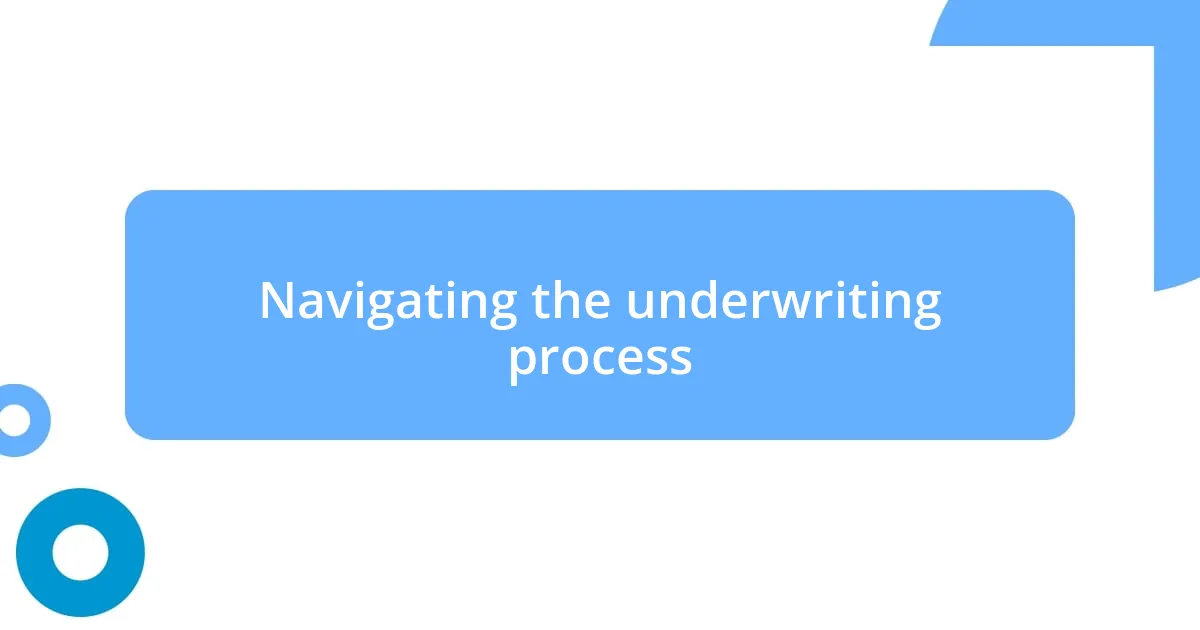
Navigating the underwriting process
The underwriting process can feel like an intricate dance, where you provide information while the lender assesses your financial stability. I was both nervous and curious as I awaited the underwriter’s verdict. I remember receiving a request for additional documents at the most unexpected times, like a Saturday night. It made me realize that these professionals are thorough, and they want to ensure that every detail aligns with their lending criteria. Have you ever felt like your financial life was under a microscope? During that stage, I certainly did.
While navigating this part of the journey, communication with my loan officer became incredibly important. There were moments when I had questions about the process or needed clarification on what was being evaluated. I vividly recall how my loan officer explained that underwriters not only check credit scores but also analyze the “three C’s”: credit, capacity, and collateral. Understanding this helped me feel a bit more in control, knowing what factors would ultimately influence the outcome. Have you thought about what these elements mean for you and your mortgage?
As I moved further into underwriting, I realized how crucial it was to stay patient. The wait can be excruciating, and I found myself biting my nails in anticipation. I learned to occupy myself with other preparations for home ownership, such as planning my eventual move. This helped ease the anxiety while waiting for that all-important approval. I recognized that while the process can feel drawn out, it’s all part of securing a home that truly fits your needs and dreams. How do you manage the waiting game in high-stakes situations? I believe finding distractions is key to staying positive!
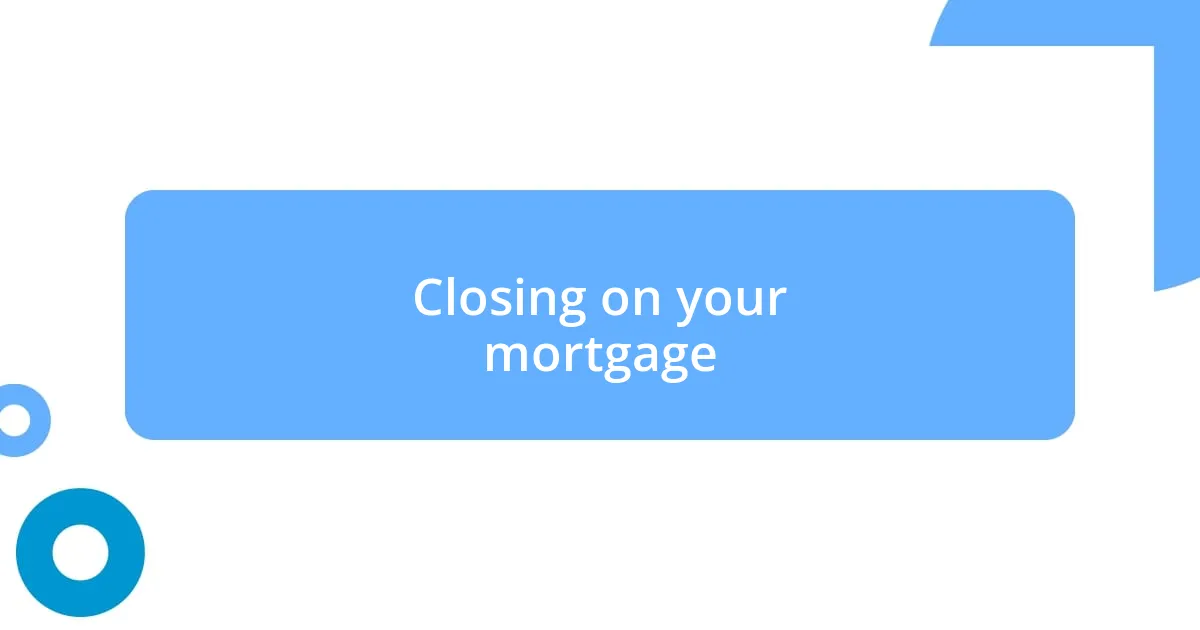
Closing on your mortgage
Closing on your mortgage can be both exhilarating and daunting. I remember the day vividly when I received the invitation to the closing table. My heart raced a bit as I walked into the room, taking in the sea of paperwork spread out before me. It suddenly hit me that this was the moment where everything I had worked for was about to become real. Have you ever felt that mix of excitement and anxiety when facing a big decision? It’s a rush like no other.
During the closing, every signature you make feels like a building block toward your future. I still recall the notary’s reassuring smile as I nervously scribbled my name across countless documents. With each stroke of the pen, I felt my anxieties melting away, replaced by a sense of accomplishment. It was essential to carefully read through all the details, from the loan terms to the closing costs. Trust me when I say, this is not a time to speed up the process! Did you know that one overlooked clause could come back to haunt you later? It’s crucial to digest every piece of information available.
As I closed the door behind me that day, leaving the lender’s office with a stack of papers and a sense of relief, I realized that this was just the beginning of a new chapter. I got to experience the symbolic passing of the keys to my new home, a moment filled with joyful disbelief. Each step of that closing process solidified not just my commitment to my new mortgage but also my dreams of homeownership. Have you thought about what that moment will mean for you? It’s transformative, and I hope you savor every second during your own closing experience!
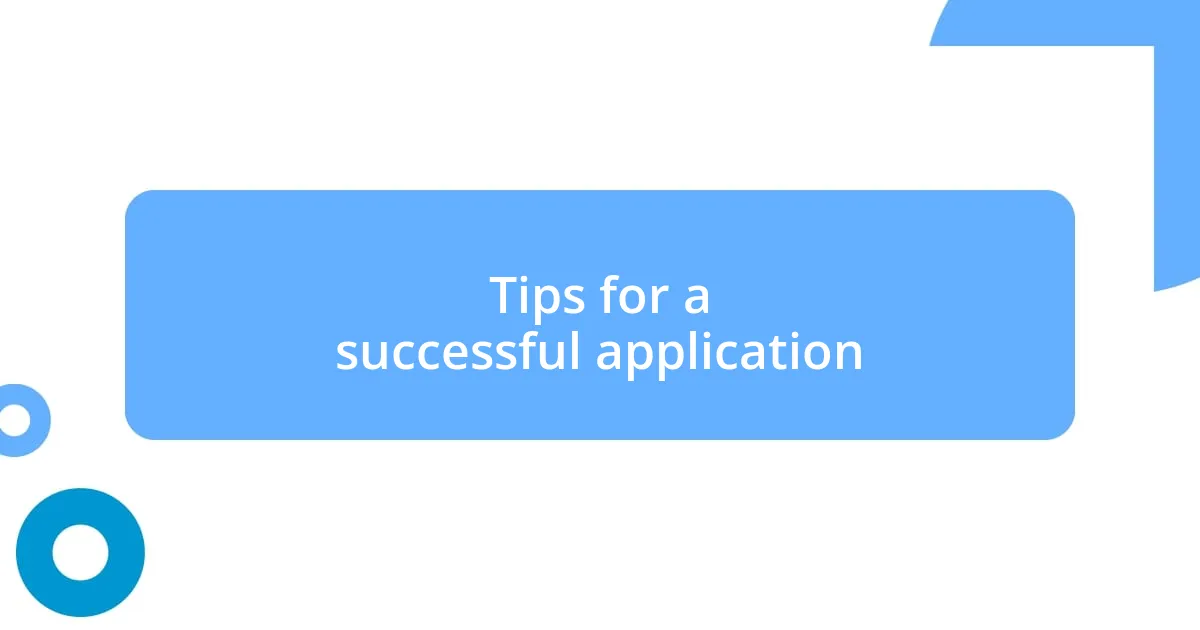
Tips for a successful application
When I started my mortgage application, I quickly realized how crucial it was to stay organized. I created a checklist to keep track of all the documents I needed, from pay stubs to tax returns. Staying prepared not only alleviated my stress but also made it easier to respond promptly to any requests from my lender. Have you ever experienced the relief that comes from being thoroughly prepared? It makes a world of difference.
I learned early on that maintaining a clear line of communication with my lender was vital. Regular check-ins helped me stay informed about the progress of my application and any potential hurdles. The more I understood what was happening behind the scenes, the less intimidating it felt. So, when the lender called me with questions, I embraced it instead of shying away. Have you thought about how proactive communication might empower your journey?
One of the best tips I can share is to avoid making any major financial changes during the application process. I remember being tempted to buy new furniture for my future home, but I chose to hold off. It’s easy to get swept up in the excitement and overlook how even small changes can impact your financial picture—like affecting your credit score. Keeping my finances stable during that time was a game changer. Have you considered how your current spending could influence your application? It’s essential to stay focused and save those purchases for after your mortgage is secured.






